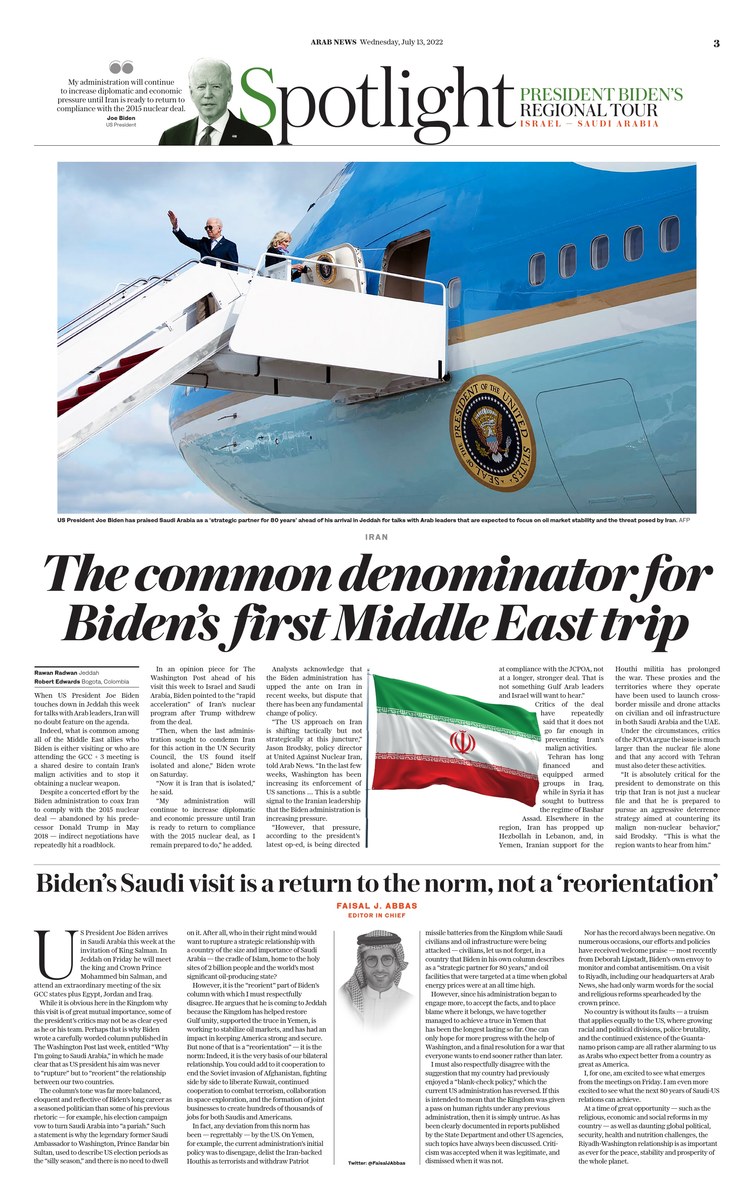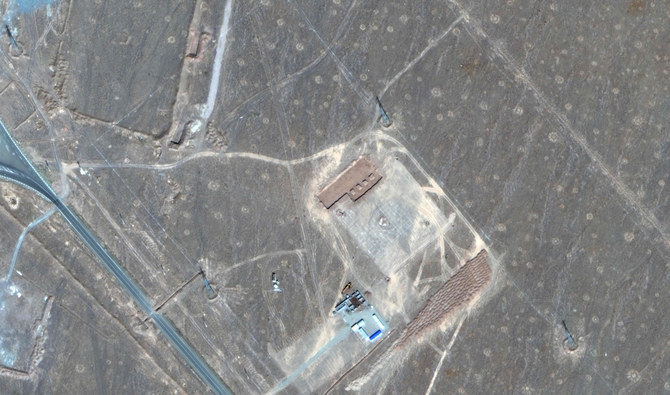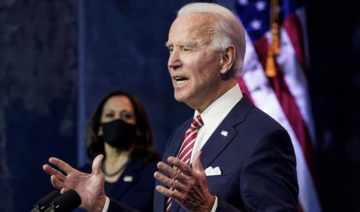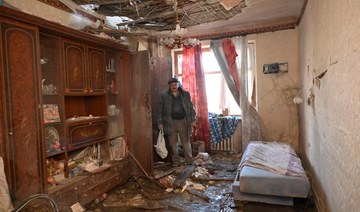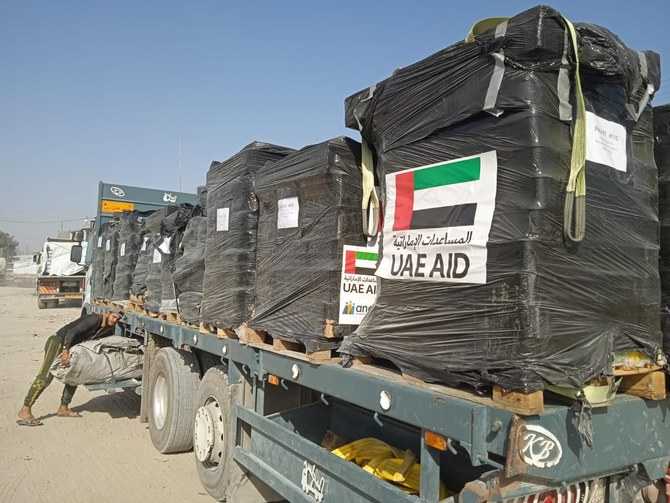JEDDAH/BOGOTA: When US President Joe Biden touches down in Riyadh this week for talks with Arab leaders, the issue of world oil prices amid the war in Ukraine and the Western boycott of Russian hydrocarbons will no doubt feature prominently on the agenda. But so too will the matter of Iran.
Indeed, what is common among all of the Middle East allies who Biden is either visiting or who are attending the GCC + 3 meeting is a shared desire to contain Iran’s malign extraterritorial activities, and to stop the regime from obtaining a nuclear weapon.
White House officials believe that Iran could now possess sufficient fissile material and perhaps even the necessary technology to weaponize and deliver a nuclear payload, handing the regime a powerful bargaining hand in negotiations.
Despite a concerted effort by the Biden administration to coax Iran to comply with the 2015 nuclear deal — abandoned by his predecessor Donald Trump in May 2018 — indirect negotiations between the two sides have repeatedly hit a roadblock.
Nevertheless, Biden has refused to lift sanctions on the Islamic republic until it returns to compliance with the accord.
In an opinion piece for The Washington Post ahead of his visit this week to Israel, the West Bank and Saudi Arabia, Biden pointed to the “rapid acceleration” of Iran’s nuclear program after Trump withdrew from the deal.
“After my predecessor reneged on a nuclear deal that was working, Iran had passed a law mandating the rapid acceleration of its nuclear program. Then, when the last administration sought to condemn Iran for this action in the UN Security Council, the US found itself isolated and alone,” Biden wrote on Saturday.
“We reunited with allies and partners in Europe, and around the world, to reverse our isolation; now it is Iran that is isolated until it returns to the nuclear deal my predecessor abandoned with no plan for what might replace it.
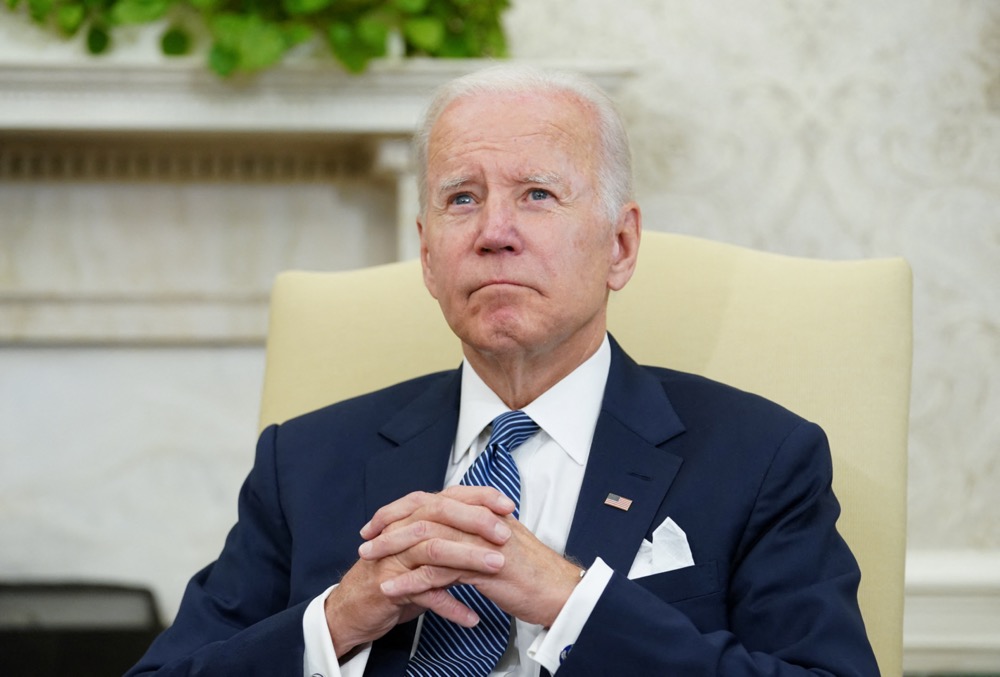
Biden has refused to lift sanctions on the Islamic republic until it returns to compliance with the accord. (Reuters)
“Last month, more than 30 countries joined us to condemn Iran’s lack of cooperation with the International Atomic Energy Agency on its past nuclear activities. My administration will continue to increase diplomatic and economic pressure until Iran is ready to return to compliance with the 2015 nuclear deal, as I remain prepared to do.”
Iran, meanwhile, has accused the Biden administration of inconsistency on the nuclear issue.
“Mr. Joe Biden’s emphasis on pursuing the policy of economic and diplomatic pressure against Iran is contradictory to the US’ continued expression of desire to revive the 2015 agreement,” Foreign Ministry spokesman Nasser Kanani told AFP on Tuesday.
The US government, “despite its slogans and claims of returning to the agreement ... follows the same approach (of the previous administration) with the continuation of sanctions and economic pressure,” he added.
Analysts acknowledge that the Biden administration has upped the ante on Iran in recent weeks, but dispute that there has been any fundamental change of policy.
“The US approach on Iran is shifting tactically but not strategically at this juncture,” Jason Brodsky, policy director at United Against Nuclear Iran, told Arab News.
“In the last few weeks, Washington has been increasing its enforcement of US sanctions. This is a change, as previously the Biden administration had levied sanctions pursuant to authorities which would not be lifted under a US return to the JCPOA.
“But in recent weeks, the US has been designating entities and individuals under Executive Order 13846, whose sanctions would be lifted in the event the JCPOA is salvaged. So this is a subtle signal to the Iranian leadership that the Biden administration is increasing pressure.
“However, that pressure, according to the president’s latest op-ed, is being directed at compliance with the JCPOA, not at a longer, stronger deal. So that remains problematic and it’s not something Gulf Arab leaders and Israel will want to hear.”
The Biden administration has been engaged in talks since April 2021 aimed at returning the US to the nuclear deal, including through the lifting of sanctions on Iran and ensuring Tehran’s full compliance with its commitments.
However, the on-off nuclear negotiations held in the Austrian capital Vienna have stalled since March, with several different unresolved issues remaining between the US and Iran.
In late June, Qatar hosted indirect talks between the US and Iran in a bid to get the Vienna process back on track, but those discussions broke up after two days without a breakthrough.
Critics of the deal — which offers Tehran sanctions relief in return for curbing its nuclear program — have repeatedly said that it does not go far enough in preventing Iran expanding its ballistic missiles program, its navy from perpetrating acts of state sponsored piracy, nor its support for militia proxies across the region.
Tehran has long financed and equipped armed groups in neighboring Iraq. Militias have routinely attacked Western military personnel, diplomatic missions and civilian infrastructure in the country, while seeking to subvert its political institutions.
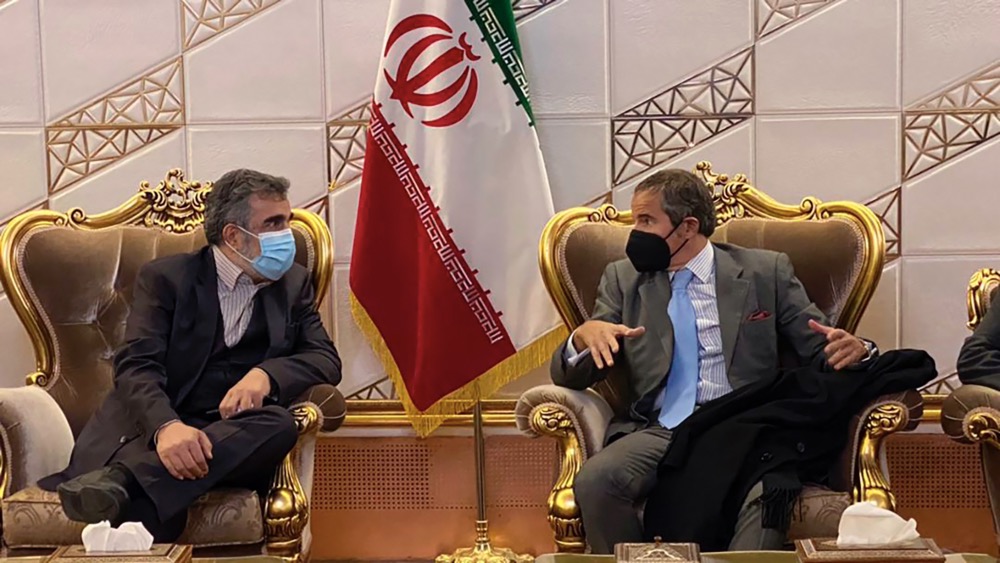
“I think the JCPOA is essentially dead, but not buried yet,” Jason Brodsky, policy director at United Against Nuclear Iran, told Arab News. (AP)
In Syria, Iran has sought to buttress the regime of Bashar Assad, sending advanced military equipment and mercenaries drawn from theaters of conflict across the region. Israeli defense officials fear that Tehran wants to use Syria as a launchpad from which to attack Israel.
Elsewhere in the region, Iran has long propped up Hezbollah in Lebanon, compounding the country’s political paralysis and societal breakdown. And in Yemen, Iranian support for the Houthi militia has only served to prolong the war and the suffering of the Yemeni people.
These proxies and the territories where they operate have been used to launch cross-border missile and drone attacks on civilian as well as oil infrastructure, in both Saudi Arabia and the UAE. Militias have also targeted commercial shipping in the region’s waterways.
Iran’s malign activities, therefore, not only threaten regional stability, but also freedom of navigation and the wider global economy.
As such, critics of the JCPOA argue that the issue is much larger than the nuclear file alone and that any accord with Tehran must also deter these activities.
“For nearly a decade, the JCPOA, presented by the Obama and Biden administrations, has seen no change,” Dr. Hamdan Al-Shehri, a political analyst and international relations scholar, told Arab News.
“They’re still at a standstill because President Biden’s administration refuses to do anything to work toward finalizing a deal that could curb Iran’s nuclear ambitions, which in return turned dangerous for the region by means of its proxies.”
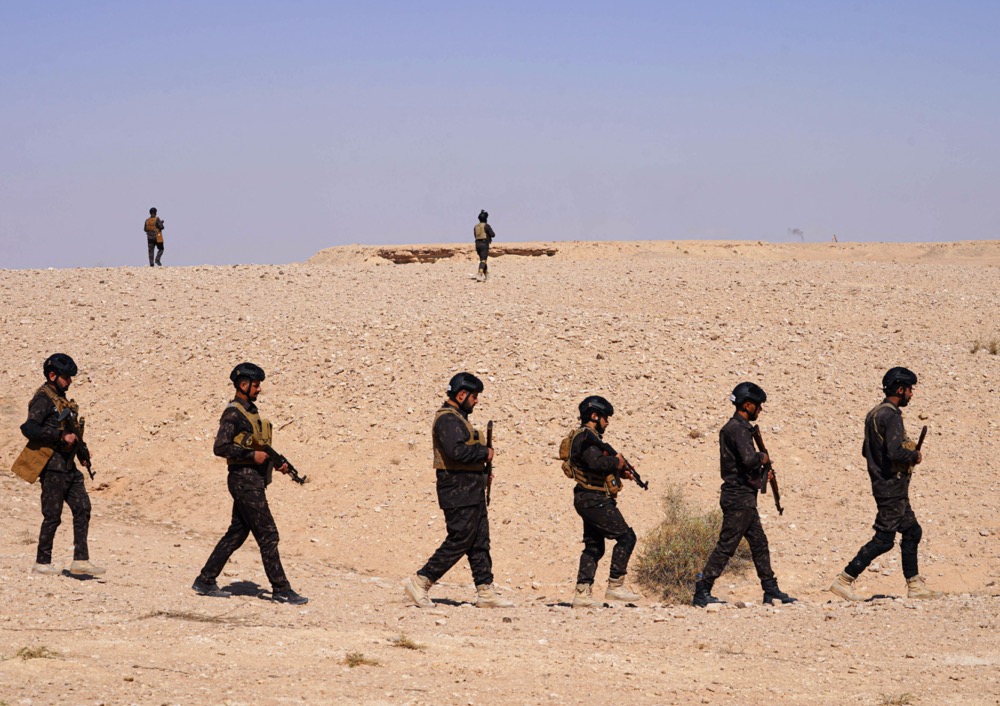
Iran has long financed and equipped armed groups in neighboring Iraq. (AFP)
Given Tehran’s activities and its rapid progress toward obtaining a nuclear weapon, many observers wonder whether the JCPOA can be salvaged at all.
“I think the JCPOA is essentially dead, but not buried yet,” said Brodsky. “It can still be revived, although the chances are very low.
“The Iranian leadership is not under the degree of pressure it was before 2013 to revive the accord, with multilateral sanctions and a more credible threat of military force to destroy Iran’s entire nuclear infrastructure in place back then.
“This is why it has felt no urgency, capitalizing on high oil prices, lax US enforcement of sanctions and a calculation that no matter what it does, the US and the E3 (France, Germany and UK) will never leave the negotiating table. The US and its European allies must change that perception.”
It is for this reason that Biden’s Middle East visit is viewed as such a valuable opportunity to change course and offer a more aggressive deterrence, be that in the form of a new Middle East Air Defense Alliance (MEAD) to counter Iran militarily, or at the very least a more concerted effort to deny Iran the funds it needs to fuel its proxies across the region.
“It is absolutely critical for the president to demonstrate on this trip that Iran is not just a nuclear file and that he is prepared to pursue an aggressive deterrence strategy aimed at countering its malign non-nuclear behavior. This is what the region wants to hear from him,” said Brodsky.
“Initiatives like MEAD are necessary, but not sufficient. Interdiction, kinetic action aimed at pushing back at Iranian aggression, and stemming the money flow to Iran’s proxy and partner network are absolutely critical. But the JCPOA resources these activities. It’s this fundamental contradiction in US policy which the president must address.”
